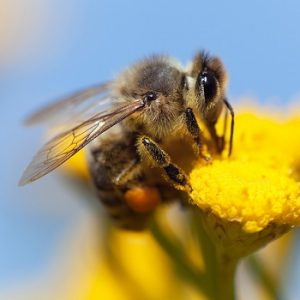
More evidence that low-calorie sweeteners are bad for your health
Studies show that artificial sweeteners can raise the risk of hypertension, metabolic syndrome, type 2 diabetes and heart disease, including stroke.

Bees and other pollinators fertilise about three-quarters of the world’s food crops, but in recent decades their numbers have been declining.
As bee populations decline, it will certainly impact our food supply and have repercussions throughout the natural world.
Things you can do
There is so much we can you can do every day help save the bees.
The first and most important action you can take is to support organic agriculture. When you do this you are supporting the type of farming that avoids harmful pesticides and encourages farmers to set aside meaningful margins of land where wildlife, including beneficial pollinators, can thrive.
You can also support beekeepers by buying local, organic honey.
Remember, also, that road verges are a vital refuge for wild flowers driven out of our farmland and, in turn, bees and other wildlife. It is important that road verges managed better whilst remaining safe for motorists, so please support the Plantlife Road Verge Petition.
Is your garden centre really ‘bee friendly?’
Our gardens and growing spaces are becoming increasingly important refuges for bees and other pollinators – especially in urban environments. But many of the flowering plants sold in garden centres as bee- or pollinator-friendly in fact contain dangerous levels of pesticides.
Researchers from Sussex University recently tested 29 different ‘bee-friendly’ plants, bought in UK garden centres, for 8 commonly used insecticides and 16 fungicides; 23 plants (almost 80%) contained more than one pesticide. Levels of neonicotinoids in the plants were high enough to be dangerous to bees.
In the UK retailer B&Q has pledged that, from February 2018, all its flowering plants are now to be grown without using pesticides that are harmful to bees. We now need to demand that other retailers step up and do the same.
Make your garden a bee haven
Whether you have a large garden or a small windowsill you can help create a bee haven with a few small actions.
Be choosy about the plants you buy, and if you maintain an organic garden – avoiding toxic pesticides that harm you and wildlife – you are helping to provide healthy ecosystem with plenty of food to help bees can thrive.
Here are a few simple tips, some of which come from our friends at Garden Organic, to help support bees in your garden:
Choose bee friendly plants – most exotic flowers and bedding plants provide very little food for bees, but many of our native wildflowers (which look beautiful in the garden too!) are important sources of pollen and nectar. These include:
Sow a bee friendly lawn While many gardeners consider clover a weed, the idea of ‘bee friendly lawns’ is gaining popularity. Sow your lawn with grass and clover and it will produce small white flowers that that provide plenty of nectar and pollen for a wide variety of bees. Otherwise, if you have a bare patch of dirt, why not cover it in clover to give your bees a treat.
Don’t be too tidy in the garden. Hollow stalks can provide winter shelter for pollinators and other insects, so do leave some as winter habitat.
Provide a natural habitat – long grass, log piles and hedgerow plants help to provide shelter and protection for bees and other insects.
Water – a shallow-edged water dish with pebbles in it can provide bees with somewhere to drink. Or, to help revive tired bees, place an eggcup with a mix of 2 tablespoons of white, granulated sugar and 1 tablespoon of water in a flower bed.
Make a bee house– Help provide shelter for bees by making your own bee house. Here’s how in three easy steps:
1 Find or make an open ended box made of untreated wood, around 20cm deep and any width/height.
2 Drill holes into dry logs or sections of untreated timber, up to 18cm long, ensuring there are no splinters in the holes and that the holes don’t reach the other end. Different sized holes will attract different bees – the harebell bee, for example, will use smaller holes.
3 Hang your bee house in a sunny position, on a firm surface such as a sturdy fence.
Protect swarms – If you see a swarm of bees, contact the local authority or the police, who will contact a local beekeeper to collect the swarm and give it a safe new home.
Together we can show our bees some love and help build a better future for everyone.

Please subscribe me to your newsletter mailing list. I have read the
privacy statement